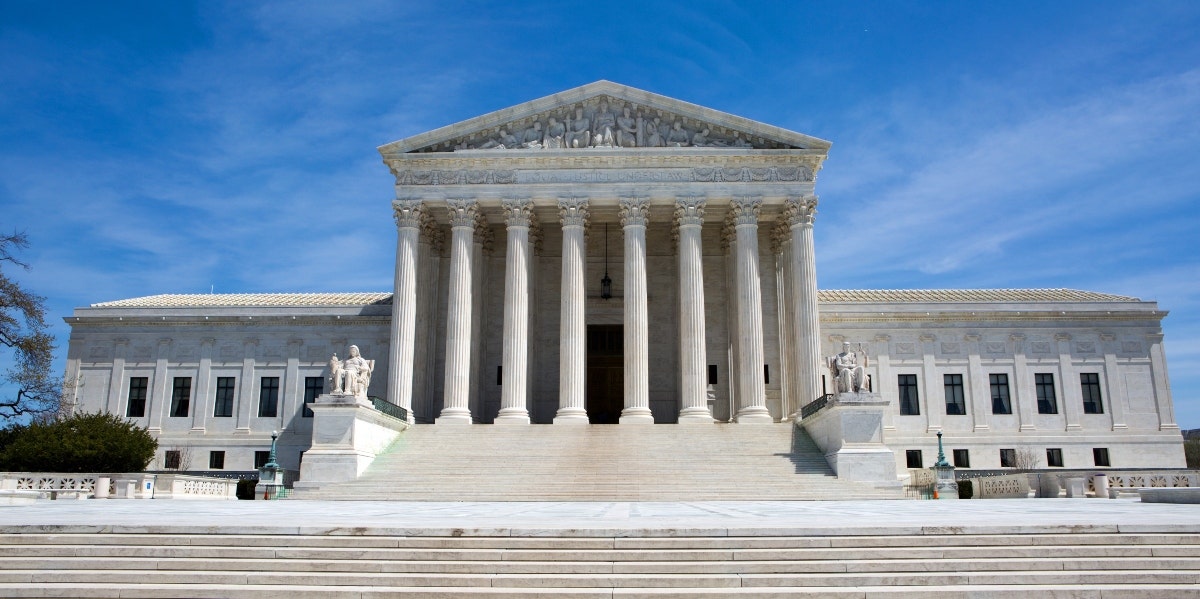Could The New Supreme Court Case On Mississippi Abortion Ban Overturn Roe V. Wade?
Reproductive rights are once again under fire.
 Steven Frame / Shutterstock
Steven Frame / Shutterstock With Roe v. Wade hanging in the balance, the Supreme Court has agreed to hear a case that could redefine abortion laws in the U.S.
The case concerns a controversial Mississippi law that heavily restricts abortions after 15 weeks, raising fears over whether the conservative-led court will consider a challenge to Roe v. Wade.
Roe v. Wade, the 1973 landmark Supreme Court decision legalizing abortion nationwide prior to viability, allows pregnancy to be terminated within the first 24 weeks.
The Mississippi test case, which proposes a ban on abortions significantly before fetal viability, creates further obstacles for pregnant people seeking abortion care. But the state has been urging the Supreme Court to use the case to clarify, or change, abortion precedents.
After being rescheduled over a dozen times, the Supreme Court will hear the case, known as Dobbs vs. Jackson Women’s Health Organization, next term. A decision is expected by June 2022.
In the midst of a culture war in which an almost 50-year-old law seems more vulnerable than ever, the case will test the court — with a 6-3 conservative majority — and their stance on abortion.
Could Roe v. Wade be overturned by Mississippi’s abortion ban?
Overturning a landmark case like Roe v. Wade does not happen overnight, nor does it happen easily. However, this is not to say that the precedent is not becoming increasingly vulnerable.
Roe v. Wade may not be explicitly overturned, but rather hollowed out and challenged to the point that it becomes practically irrelevant.
The Mississippi law does not ban abortion outright, it just moves the goalposts of accessibility. This gives the Supreme Court an avenue to render Roe v. Wade little more than an empty promise.
Waiting in the sidelines of this case is a series of restrictive abortion laws across states that have yet to go into effect, either because of court actions or later effective dates. South Carolina and Idaho have codified bans this year on abortion at the onset of a fetal heartbeat.
Arkansas and Oklahoma have enacted near-total abortion bans, and Montana capped the procedure at 20 weeks.
Any further challenges to Roe v. Wade could create an open season on abortion bans in red states.
What the Supreme Court’s conservative majority means for abortion laws?
Bans on pre-viability abortion bans have been struck down by the court until recently. In 2016, the court blocked a 12-week abortion ban in Arkansas, the same year a law to limit abortion to the first 6 weeks of pregnancy was stopped in North Dakota.
But the changing faces of the Court in 2020 marked a new threat to Roe v. Wade. Less than 3 months after the death of Justice Ruth Bader Ginsburg, a major advocate of reproductive rights, her seat was given to Justice Amy Coney Barrett, who is documented as being firmly anti-choice.
Since their appointment, the conservative-led Court has expressed a keen interest in rolling back reproductive rights.
In January, the Supreme Court agreed to limit access to a drug used for early abortions. The court also agreed to hear whether Kentucky's Republican attorney general can defend a controversial abortion-related law even though it had been struck down in lower courts.
The repeated determinatino to take on these cases reflects a faltering stability in the decades-long movement to extend abortion accessibility and improve reproductive healthcare.
What happens if Roe v. Wade is overturned?
The weakening of Roe v. Wade could create dramatic inequality in abortion access across the nation.
According to a 2020 data analysis, more than half of the states would leave abortion access unchanged. However, for those in the American South and Midwest, especially those in low-income homes, abortion would be effectively inaccessible.
Without Roe, abortion would probably become illegal in 22 states. 41% of people of childbearing age would have to travel an average of 280 miles to access an abortion clinic, up from 36 miles now.
The data estimates that there would be 100,000 fewer legal, safe abortions per year. But we have no way of knowing how many people would have to put their lives in danger in illegal surgical abortions or by obtaining mail-order abortion pills.
Even if Roe v. Wade is not overturned, the restrictions the Supreme Court is considering could revoke access, increase wait times, or increase travel distances.
This creates dangerous, unequal situations where reproductive healthcare is shunned by the highest court in the nation.
Data shows that abortion rates are broadly the same in countries where abortion is illegal and in countries where it isn’t. The only difference is whether or not these abortions are safe, a difference that is threatened by any restrictive abortion law.
Alice Kelly is a writer living in Brooklyn, New York. Catch her covering all things social justice, news, and entertainment. Keep up with her Twitter for more.
